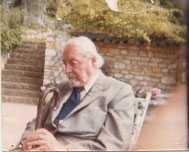 Mind Shadows Some Notes on Enlightenment
Mind Shadows Some Notes on EnlightenmentThese comments don't pertain mainly to enlightenment as such, whatever it might be, but to the silliness that surrounds it.
All religion, including Buddhism and Hinduism, begins with faith. Maharshi's ashram followers had faith in him as a model of what they might become. He was their authority and so, observing him daily, they shaped their behavior after him. (This is rather like Nineteenth Century Japanese rendering even the scroll work on the muzzles of Admiral Perry's cannons. Uncertain of the physics principles, they scrupulously copied the ordinance so that nothing might go wrong.)
In Zen, Buddha is sometimes called a shit stick, or students are told, If you meet the Buddha on the road kill him. The point of this is not irreverence for its own sake.
Under the light of conscious investigation, sense of self disappears and frees the individual from usual anxieties, and mental chatter. It has not gone away, however. It has retreated to the decentralized nodes of consciousness.
Understand that it does not reside there as some invisible entity. (See the earlier comment on biology and emergent pheonomena; it cannot be located in its neural parts.) Rather, the Buddhist explanation nicely accounts for it as form emerging from emptiness. This is similar to quanta potentia in Quantum Theory.
(As an experiment in perception, stare at a blue dot lit against a yellow background. After a few minutes the blue merges with the yellow.)
Which is more heroic? The search for Truth? Or working with AIDS victims in Mozambique?
Some current spiritual teachers claim they have answers, albeit to the same questions Buddha resisted.
Home







